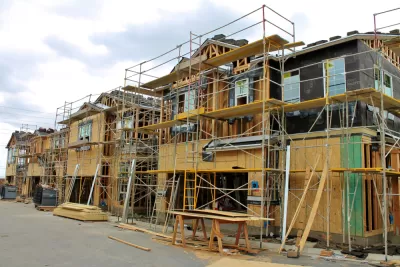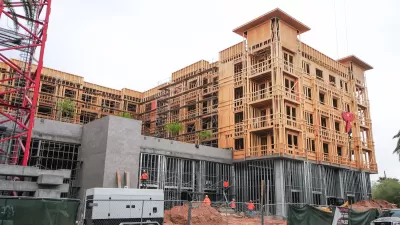Legislators in five U.S. states this year will consider laws that create a state tax incentive program for low-income housing developers.

The lack of affordable housing around the country is inspiring states, namely Iowa, Kansas, Kentucky, North Carolina, and Ohio, to consider new legislation that would create tax breaks for low-income housing developers, according to an article by Kristian Hernández for Pew's Stateline.
"The state programs are designed to supplement the federal Low-Income Housing Tax Credit program, known as LIHTC, which was created in 1986," explains Hernández. These state tax break programs are growing in popularity as more communities around the nation grapple with a lack of housing affordable to lower income households.
"Nationwide, there is a shortage of some 7 million rental homes that are affordable to the lowest income households, according to an annual report released in October by the Public and Affordable Housing Research Corporation and the National Low Income Housing Coalition," writes Hernández. "By 2031 that number could be closer to 8 million, as rent restrictions expire on some 745,000 homes where, because of federal programs, tenants pay less than market rent."
Arizona created its own program in the past year, and legislation in Mississippi came up just short. For insight into the need for a state version of the LIHTC program, the article digs deeper into the Arizona examples, including soundbites from Ruby Dhillon-Williams, assistant deputy director of housing and community development for the Arizona Department of Housing, who says the state has particular need for affordable housing options in rural areas and for rental properties near healthcare facilities.
According to the article, the other 22 states with low-income housing tax credit programs are Arkansas, California, Colorado, Connecticut, D.C., Georgia, Hawaii, Illinois, Maine, Massachusetts, Missouri, Nebraska, Nevada, New Jersey, New Mexico, New York, Oklahoma, Pennsylvania, South Carolina, Utah, Vermont, Virginia and Wisconsin. Among those states, according to Hernández, Colorado has been one of the most successful in leveraging tax breaks for low-income housing development.
More details and background are available in the source article below.
FULL STORY: Here's One Way States Are Boosting Affordable Housing

Maui's Vacation Rental Debate Turns Ugly
Verbal attacks, misinformation campaigns and fistfights plague a high-stakes debate to convert thousands of vacation rentals into long-term housing.

Planetizen Federal Action Tracker
A weekly monitor of how Trump’s orders and actions are impacting planners and planning in America.

In Urban Planning, AI Prompting Could be the New Design Thinking
Creativity has long been key to great urban design. What if we see AI as our new creative partner?

King County Supportive Housing Program Offers Hope for Unhoused Residents
The county is taking a ‘Housing First’ approach that prioritizes getting people into housing, then offering wraparound supportive services.

Researchers Use AI to Get Clearer Picture of US Housing
Analysts are using artificial intelligence to supercharge their research by allowing them to comb through data faster. Though these AI tools can be error prone, they save time and housing researchers are optimistic about the future.

Making Shared Micromobility More Inclusive
Cities and shared mobility system operators can do more to include people with disabilities in planning and operations, per a new report.
Urban Design for Planners 1: Software Tools
This six-course series explores essential urban design concepts using open source software and equips planners with the tools they need to participate fully in the urban design process.
Planning for Universal Design
Learn the tools for implementing Universal Design in planning regulations.
planning NEXT
Appalachian Highlands Housing Partners
Mpact (founded as Rail~Volution)
City of Camden Redevelopment Agency
City of Astoria
City of Portland
City of Laramie





























